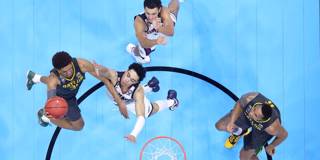The NCAA is asking the US Supreme Court to endorse the fiction that it is preserving amateurism in athletics, rather than presiding over a profitable scheme of labor exploitation. But the fact is that the NCAA's behavior in any other part of the economy would be illegal.
CHICAGO – Last week, as the National Collegiate Athletic Association’s “March Madness” basketball championship neared its conclusion, the US Supreme Court heard a case brought by Shawne Alston, a former college football player, against the NCAA. Alston claims that the NCAA may not restrict certain types of compensation for student athletes. But the case highlights a broader, long-simmering complaint: In the name of preserving amateurism in college sports, the NCAA operates an exploitative system that enables a handful of universities to earn millions of dollars from the work of players who are neither remunerated nor even (in some cases) afforded a decent education.
The Court faces a paradox. Everyone agrees that the NCAA should be allowed to preserve amateur sports, which by definition must be unpaid for the players. But, because student athletes are barred from sharing in television and box-office revenues, that money flows entirely to the universities, which in turn often pay multi-million-dollar salaries to coaches.
In any other part of the economy, an agreement among employers to suppress workers’ compensation is illegal. Amateur sports are legal, of course, but that is because they are normally – in economists’ terms – examples of consumption (people do it for fun) rather than production (people do it in order to enable others to consume an entertainment product).

CHICAGO – Last week, as the National Collegiate Athletic Association’s “March Madness” basketball championship neared its conclusion, the US Supreme Court heard a case brought by Shawne Alston, a former college football player, against the NCAA. Alston claims that the NCAA may not restrict certain types of compensation for student athletes. But the case highlights a broader, long-simmering complaint: In the name of preserving amateurism in college sports, the NCAA operates an exploitative system that enables a handful of universities to earn millions of dollars from the work of players who are neither remunerated nor even (in some cases) afforded a decent education.
The Court faces a paradox. Everyone agrees that the NCAA should be allowed to preserve amateur sports, which by definition must be unpaid for the players. But, because student athletes are barred from sharing in television and box-office revenues, that money flows entirely to the universities, which in turn often pay multi-million-dollar salaries to coaches.
In any other part of the economy, an agreement among employers to suppress workers’ compensation is illegal. Amateur sports are legal, of course, but that is because they are normally – in economists’ terms – examples of consumption (people do it for fun) rather than production (people do it in order to enable others to consume an entertainment product).